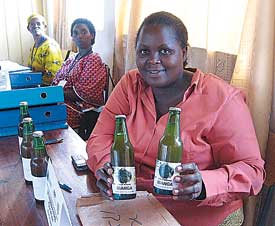One woman makes wine from bananas and would like to buy new equipment and increase her workforce. Another woman sells spare car parts and would like to create a business network. A third makes bricks and wants to buy new equipment to increase capacity and build a shed for storage.

Most of the 30 women enrolled in the Goldman Sachs Entrepreneurship Certificate Program in Rwanda are widowed, and many are supporting young relatives who lost parents in that country’s 1994 genocide. All are determined to grow their businesses not only to improve their lives but the lives of their families.
The women took the first steps to building their businesses when the program, organized by the William Davidson Institute (WDI), started in early September. The women gathered in Kigali, Rwanda, for four days of instruction on entrepreneurship and business strategy.
They returned a few weeks later to Kigali for three more days of classes on how to develop a successful business plan. In all there are nine multiple-day sessions throughout the six-month program.
The program is sponsored by Goldman Sachs under its new 10,000 Women initiative, which seeks to give that number of women around the world a business and management education in the next five years. The sponsorship means that all accepted participants attend the program tuition-free.
Aimed at existing and aspiring entrepreneurs, the program was designed by the WDI Executive Education department in consultation with business school faculty in the United States; WDI’s partner in Rwanda, the School of Finance & Banking (SFB); and the Chamber of Women Entrepreneurs in Rwanda.
It gives the 30 female participants from Rwanda the knowledge and skills needed to launch or expand business enterprises. The women will learn business planning, marketing, finance, accounting and management during their training.
Participants include many women in the handicraft sector, several involved in selling food products, a restaurant owner, a furniture maker and a woman in the process of setting up a computer training company. They range in age from 27-61.
“I was really happy to be able to travel to Kigali to meet all of the women,” says Amy Gillett, director of the Executive Education department. “Most of them have faced many challenges in their personal and professional lives. Many lost husbands during the genocide in 1994. Some are supporting several kids on incomes as low as $40 a month. Others are battling disease or taking care of sick children.
“Despite their hardships, they are very optimistic and driven to make their businesses successful. They told me during the program that they have only themselves to rely on and that many people are relying on their success.”
The women have been assigned to one of five sector groups based on their industry. Each industry group has a faculty consultant who will provide hands-on assistance and consulting as the participants proceed in putting together their business plans.
At the end of the program, each participant will present her own business plan. Four $2,500 awards for the best business plans will be given out by WDI at the end of the program. A new six-month program with 30 new participants will begin in February 2009.

